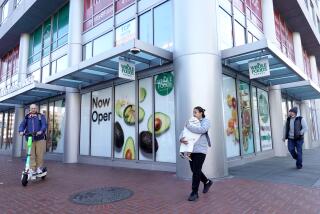Self-Regulatory Group to Police Clothes Makers’ Work Conditions : Apparel: Labor Secretary Robert B. Reich hails consortium as one of the most effective ways of eliminating sweatshops.
- Share via
Expanding current efforts to crack down on sweatshops in Southern California’s garment industry, Labor Department officials and local manufacturers have agreed to set up a consortium to police working conditions.
Labor Secretary Robert B. Reich is due to announce the details of the consortium, to be known as the Compliance Alliance, during a visit to the Los Angeles area Wednesday. In essence, the consortium will be a self-regulatory group run by manufacturers that will conduct regular audits of contractors to screen out shops that break laws on minimum wage, overtime pay and child labor.
In a telephone interview Monday, Reich said enlisting industry involvement in the enforcement initiative marks “a major, major step forward” in curbing widespread workplace abuses among Southland garment contractors. He said the consortium is the first group of its type in the apparel industry.
“This is one of the most effective ways of eliminating sweatshops, thus reducing the magnet for undocumented workers that sweatshops often represent,” he said.
Officials expect nine or 10 Los Angeles apparel manufacturers to sign agreements Wednesday to participate in the consortium. Talks with more firms are under way, and officials hope the program will spread throughout the industry in the area.
The consortium’s requirements resemble, but are more lenient than, the detailed “long-form” enforcement agreements that a dozen Southern California manufacturers have already entered over the last several years under pressure from the Labor Department.
Both the long-form and consortium efforts stem from regulators’ past frustrations in enforcing labor laws in the apparel industry. Traditionally, regulators have often found that the worst workplace abuses occur in small, fly-by-night contracting shops that simply close down and open under another name when government inspectors discover their wrongdoings.
Consequently, authorities several years ago pressured manufacturers to take responsibility for their contractors’ practices. They employed a little-known 1938 law known as the “hot goods statute,” which bars interstate transport of goods made at companies violating federal labor law.
In a major precedent in 1992, the Labor Department investigated Guess Inc., Southern California’s biggest apparel firm, under the statute and extracted a long-form agreement requiring the company to monitor its contractors.
Both Reich and Richard Reinis, the Los Angeles lawyer who conceived of the consortium, said mounting pressure from “hot goods” investigations prompted manufacturers to set up the self-regulatory program.
Reinis, the son of a coat manufacturer and an attorney for numerous apparel companies, said he “decided that for my clients, it made no sense to wait until they had a gun to their heads, that they should form a group” to regulate themselves.
In addition, Reinis said the consortium will help level the competition between manufacturers that use ethical contractors and competitors that have undercut them by relying on rogue contractors paying illegally low wages.
Also, manufacturers joining the consortium will gain legal protection that, in case they ever are sued by the Labor Department, will place a greater burden on the government to prove its case.
All the same, Labor Department officials said the consortium will accomplish their aims while relieving some of the burden for inspections from their agency. The consortium will conduct quarterly reviews of all of the sewing and cutting contractors doing business with its members.
Contractors found to be violating labor law will face additional monitoring and, if their performance does not improve, will be barred from doing business with consortium members.
The initial 10 companies to join the consortium have combined annual sales exceeding $400 million. The biggest firms include Joni Blair, Jalate Inc., Koral Industries, Podell Industries, Little Laura of California and BeBop Clothing.
Peter Koral of Koral Industries was named president, and Larry Brahim of Jalate will be chairman.
Even though it is a powerful force in Los Angeles and Orange counties, currently employing well over 100,000 workers, the apparel industry’s reputation has long been tainted by workplace abuses.
In addition, the industry in Southern California has been rocked by the news that three executives have been killed and others threatened in the past two years in a wave of violence still under investigation. The incidents have been linked to California Fashion Industries, which sells clothing under the Carole Little label.
More to Read
Sign up for Essential California
The most important California stories and recommendations in your inbox every morning.
You may occasionally receive promotional content from the Los Angeles Times.













